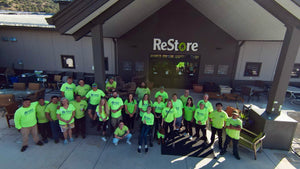Net-Zero Heroes
Energy-efficient solutions to an affordable housing crisis
An affordable net-zero commununity in Basalt aims to serve a critical segment of the community—teachers.
A new affordable housing community in Roaring Fork Valley, Basalt Vista, is definitively a community project. Roaring Fork School District donated seven acres adjacent to Basalt High School that are worth $3.2 million. Pitkin County provided funding for roads and utilities, and rooftop solar panels. The Town of Basalt reduced permit fees to facilitate building. Holy Cross Energy donated solar equipment and electric vehicle chargers for four units, and the Roaring Fork Valley chapter of Habitat for Humanity is building the homes with its team of employees, subcontractors, volunteers and the homeowners themselves.
Habitat for Humanity’s mission in Roaring Fork Valley has been to “build homes for people who are stuck in a cycle of poverty,” said Scott Gilbert, president of the Roaring Fork chapter.
However, the goal of the development is not just to meet a critical housing need, but to bring the “first net-zero community to the Western Slope.” Holy Cross Energy, a sustainable energy provider serving the Roaring Fork Valley, is treating the project as a pilot program, working with the National Renewable Energy Laboratoryto study the efficiency and energy demand of these types of homes, as well as how comfortable they are for owners.
“We wanted to do first-of-its-kind pilot field demonstration on how to better visualize our grid and control distributed energy resources, such as photovoltaic solar, storage using batteries, electric vehicles, and also [homeowner] comfort,” according to Chris Bilby, an engineer at Holy Cross.



